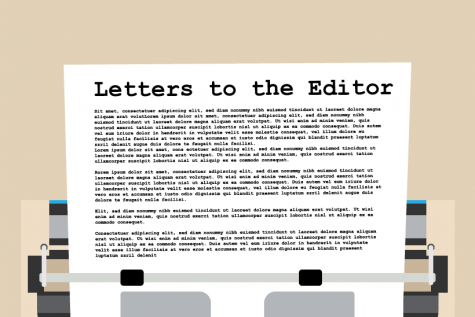Letters to the Editor
Free speech in the education system
The controversy surrounding free speech, especially as it relates to academia, has been prevalent for as long as political discourse has existed. Ideas of “facts versus feelings” remain a topic of discussion, though many who seem to believe in this ideology do not support it when these facts do not support them. However, there must be a clear distinction between simple opinion and the experiences of marginalized communities that allows them to speak from their own experiences. The school system is a platform to discuss these experiences but it must be accompanied by students willing to listen.
Opinions might not be able to be completely wrong, but this does not change the impact of these opinions in the real world. “Opinions” rooted in racism and bigotry are inherently harmful. Many assume the idea that having an opinion means it must be respected. However, many of these oppressive stances lead to revealing of ignorance regarding deeply-rooted systemic problems. This is exactly where our education system comes into play. There are a variety of different teachers from a variety of different backgrounds, who do not share the same viewpoints. It is easy to believe that teachers who have political opinions are “indoctrinating” their students and not allowing free-thinking. The opposite is true.
On the collegiate level, there is a large misunderstanding regarding free speech. Using examples of speakers being stopped at college campuses and simply stating it is because of their certain viewpoint is a gross oversimplification. These issues might warrant more than “some 500 words.” For example, let’s look at the incident of Ben Shapiro at California State University in Los Angeles. Rather than being canceled for his conservative views, the statement released by the university remarked that the event “caused concern for the campus community,” and “given threats and expressions of fear,” it was canceled. The main concern of these colleges is for the safety of their students. I admit that I support giving anyone a platform to speak and express themselves if they choose. However, when this expression has a looming threat of violence, these universities must draw the line in order to protect their students.
On top of this, this issue is not as prevalent as some may have you believe. Georgetown University’s Free Speech Project completed data analysis of free speech incidences on college campuses. Since 2016, there have been more than 90 incidents fitting the criteria of a person’s free speech being threatened. Approximately 60 of these took place on college campuses. Out of the over 4,000 colleges and universities in the United States, these “attacks on free speech” are few and far between. Rather, the media and discourse surrounding this issue is a classic case of fear-mongering. Without doing any research, it is easy to believe that the “liberal education system” is targeting and shutting down conservative views. However, upon closer examination of the issue, we can understand that, for the most part, a wide spectrum of free speech is protected in a school environment.
When discussing everyday political conversation, it is imperative to understand the consequences of certain opinions. There are some statements that are just facts. Systemic racism exists and is prevalent in our society, especially in the United States. There are a multitude of examples of oppression and discrimination based on race, ethnicity, gender, sexuality, etc. These have been proven with countless studies across different areas of life, from criminal justice to the workplace. Those who preach “facts over feelings” hypocritically might disagree with these facts. This simply reveals that they only accept the truth when it works in their favor.
Even when someone does have a certain opinion, there are repercussions they seem to ignore. Yes, a person might have an opinion that is racist, sexist, homophobic, or oppressive. And yes, this opinion might technically be protected as free speech. But protection of speech does not mean protection from consequences. Teachers and professors thrive off of differences in opinion and interpretation. However, a line is drawn when a student is ignoring facts and reality, and instead is simply inciting hate, turning a debate into a fight. Because these views that create a toxic environment are generally produced by right-wing students, instead of reflecting on what they say and listening when others critique them, they victimize themselves and seem to make the general public believe that they are being oppressed. But we cannot let them do this.
This brings me to my final point: listening. Listening to others when they disagree. Listening politely in debates in order to have a proactive argument. Listening to the actual facts, rather than the opinions of those who simply say that their word is true. And lastly, listening to those who experience these issues. It is easy to come from a place of privilege and ignore the feelings of marginalized communities on issues that directly affect them. But for those who actually experience this oppression, their opinion is more than just that. It is an insight into the real issues. When we equate this first-hand experience with simple opinions, this diminishes the voices of those most affected by the issue, and thus prevents true progress.
Ultimately, my argument comes down to the idea of thinking for yourself. In schools and universities, students are provided a safe platform to express themselves, even regarding their political views. Every student has a guaranteed freedom of speech. However, those that incite hate should not be tolerated. By listening and reflecting on all sides of an issue, we can better understand each other and ultimately progress as a society.
All content is soley from the guest writer. The Hagertyjourn staff reserves the right to decide what letters will be published. If you are interested in submitting a letter to our column, email a Google Doc/Microsoft Word document to [email protected]
Your donation will support the student journalists of Hagerty High School. We are an ad-free publication, and your contribution helps us publish six issues of the BluePrint and cover our annual website hosting costs. Thank you so much!



